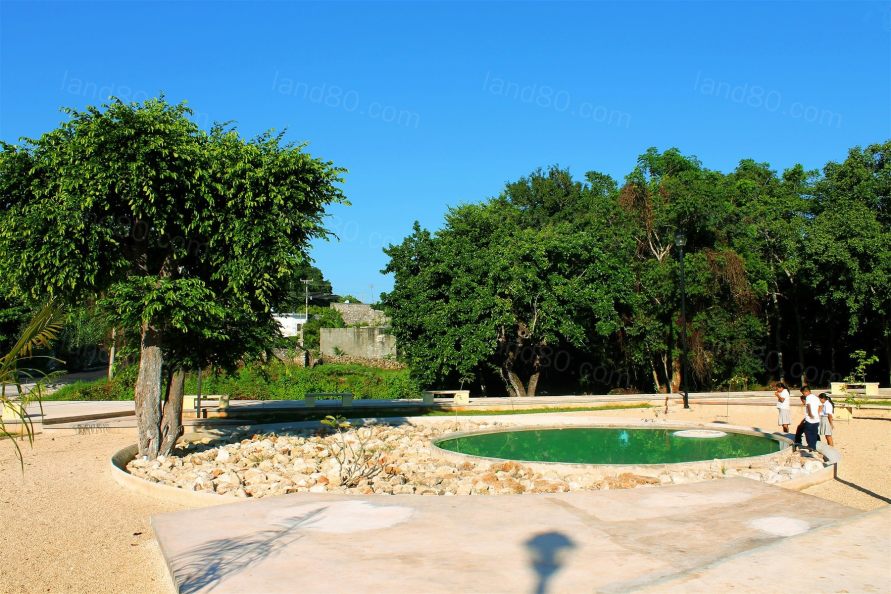这个项目是通过公共水井恢复埃斯皮塔公共空间计划的先决条件。“埃斯皮塔(Espita)”这个名字来源于玛雅语“x p’iit ha”,意思是“跳跃的水”;这是基于当地小镇的雨水直接流向沟壑的现象 – 当地称之为Rejolladas – 类似于小瀑布。
Taller de Arquitectura Contextual: This project is the direct antecedent to a program for the recovery of public spaces in Espita through its public wells. The origin of the name “Espita” comes from the Mayan “x p’iit ha” which means “water that jumps”; this is based on the fact that the rainwater of the town is directed towards the ravines – or rejolladas, as they are called locally – resembling small waterfalls.

© Carlos Patrón
尤卡坦州埃斯皮塔市区有3个主要的Rejolladas,只有一处对外开放。由于这里因忽视管理而易导致高频率的严重犯罪,所以成为了社区内的一个危险点。因此在最开始时,社区要求市政当局对此采取措施,领导人决定移除场地原有的茂密植被,提高场地视野的通透度,随后进行铺砌,防止植物再次生长。但是此举在实施过程中带来了严重的水管理问题,因此社区停止了这一倡议,并在之后一次的公共管理中通过一个民间协会,向推进Rejollada公共空间恢复项目进行捐款。值得一提的是,这项公共空间的恢复工作从执行到融资都由市政府直接参与。
The urban area of Espita, Yucatán has 3 main rejolladas, and only one of these is publicly accessible, which became a dangerous point within the community, due to the frequency of serious crimes due to the carelessness of the place. Therefore, the community asked the municipal president in turn to take measures in this regard, and he decided to destroy the dense vegetation of the site (in order to improve visibility), to later pave and prevent it from ever growing again. That action brought severe flood problems during its process, so the community itself stopped the initiative and, in the next public administration, through a civil association, the donation of the Rejollada public space recovery project was made. It is important to bear in mind that both the execution of the work, as well as its financing, was directly attended by the municipality.

© TACO taller de arquitectura contextual
面对这片被砍伐的森林,一方面是要恢复场地的生态意识,从保护和增强建筑和自然遗产的原则出发,以自流井的废墟、在建的小教堂和该社区中唯一留存的树木作为指导设计的路线;另一方面,为社会提供一个满足人们需求、用途和习惯的安全场所,容纳各种文化和娱乐活动以实现空间的多功能性,造福埃斯皮塔人民。
The objective on the one hand was to restore the ecological sense to a rejollada that had been deforested, starting from the principle of conservation and enhancement of the architectural and natural heritage by taking the ruins of an artisan well, the foundations of a chapel in process and the only surviving tree located on the property as guiding design axes; and on the other hand, return to the society a safe place that satisfies its needs, uses and customs, achieving multifunctional spaces that would accommodate cultural and recreational activities for the benefit of the people of Espita.

© Carlos Patrón
项目位于一个典型街区的东南角,面积1945平方米,与街道接壤,并毗邻私人领域,交汇处有一条穿过Rejollada的公共步行道,公园的设计中也继续沿用了这一路线。
The project is developed in an area of 1945m2 in the south-east corner of a typical block, adjoining streets on two of its adjacent sides, and with private properties on the opposite sides, at whose convergence there is a public pedestrian path that crossed the rejollada, a journey that was taken up again in the design of the park.

© Carlos Patrón

© Carlos Patrón
该设计是多功能的,它可以随着时间的变化适应各种活动,可以拥有的不同类型的用户。人行道的设计遵循居民走过的路径,以实现其通行功能。同时还设置了一条环路以保证娱乐空间的流通性,这继承了传统尤卡坦公园的风格。人行道在到达公园后变得更宽阔,以便塑造起支持开展商业、文化或体育活动的小广场。
城市家具的设计体现了不同形式的共存,并始终具有足够的灵活性以重新适应用户需求。地面纹理根据行人交通对其产生的影响来设定,步行路段用混凝土锻造而成,防滑的表面经过了水洗处理。
The program is versatile, so that it can adapt to various activities over time, as well as to the different types of users it may have. The walkways fulfill functions of pedestrian connectivity, by respecting the paths traced by the inhabitants, but also promoting recreational circulation through a circuit, retaking the heritage of traditional Yucatecan parks. The sidewalks are extended when arriving at the park in order to create small squares where commercial, cultural, or physical activities can take place.
The urban furniture was designed in a way that suggested different forms of coexistence, but that in the end it had enough flexibility to be reinvented by its users. The floor textures were determined based on the impact that pedestrian traffic would have on them. The walkers are forged with concrete in a washed finish to make them slip resistant.

© Carlos Patrón
© Carlos Patrón
自流井周围的空间在压实材料层上铺设了松散的砾石,可以牢固表面还不会失去其过滤性能。这些空间的高度低于人行道,与现有的井(起溢流作用)一起,形成了一个挡水和疏解系统,防止雨季洪水阻碍公园的正常通行。
当地石头在该项目中扮演着非常重要的角色,尤其是在公园的设计元素中。这些石头以艺术干预的方式填补了井的空隙,强调了这口圆形井的水元素,并与场地中唯一留存下来的树木相互依偎。由Espiteños的“albarradas”石头装饰,这隐喻了保护其前身的社区,同时还使场地的最低点仍然有水蓄积。
The spreading spaces contemplate gravel from the loose region on a layer of compacted material enough to stabilize the ground without it losing its filtering properties. These spaces are at a lower level than the walkways and, together with the existing well (which functions as an overflow), creates a water containment and evacuation system that prevents floods in rainy seasons from hindering mobility through the park.
The local stone plays a very important role in the project, especially in the symbolic element of the park, an artistic intervention that recovers the void of the well and emphasizes it with a circular water element that remains inside a larger one that reaches the only surviving tree of the original rejollada, and it is upholstered by stones of “albarradas” from the Espiteños, referring to a community that protects its preexistence, and maintaining the presence of water at the lowest point of the rejollada.

© Carlos Patrón
我们在挑选重新造林用的植被时,大多选择地方性植被。我们还选择了能吸引野鸟的植物、在附近发现的乡土果树、开花树木以及代表尤卡坦文化的标志性植物,如木棉、鸡尾草和皇家棕榈,再造林的斜坡用低维护的乡土地被植物抬高起来。
The vegetation proposed for reforestation is mostly endemic. Plants that attract wild birds, regional fruit trees found in neighborhood backyards, flowering trees, and iconic plants of the Yucatecan culture such as the ceiba, henequen and royal palm were proposed. The slopes were raised with low-maintenance regional ground covers.

© Carlos Patrón
时至今日,Rejollada公园见证了一系列的政治事件和艺术表演。除此之外,还有健身活动、晚间散步、情侣聚会、街头足球等活动在此开展,当然还有一个公共水池可供戏水。
To this day, Rejollada Park has witnessed both political events and artistic presentations; as well as physical conditioning activities, evening walks, a meeting point for couples, a street soccer field and of course a public pool.

© Carlos Patrón

© TACO taller de arquitectura contextual

© TACO taller de arquitectura contextual

© TACO taller de arquitectura contextual
项目名称:Rejollada公园
设计:TACO taller de arquitectura contextual
施工:TACO contextual architecture workshop
团队:Carlos Patrón Ibarra、Orlando Franco、Rebeca Novelo
土地面积:1945平方米
竣工年份:2015
地点:墨西哥埃斯皮塔
照片:Carlos Patrón
Project name: Rejollada Park
Design: TACO taller de arquitectura contextual
Construction: TACO contextual architecture workshop
General team: Carlos Patrón Ibarra, Orlando Franco, Rebeca Novelo.
Land area: 1945 m2
Completion year: 2015
Location: Espita, Mexico
Photographs: Carlos Patrón
|